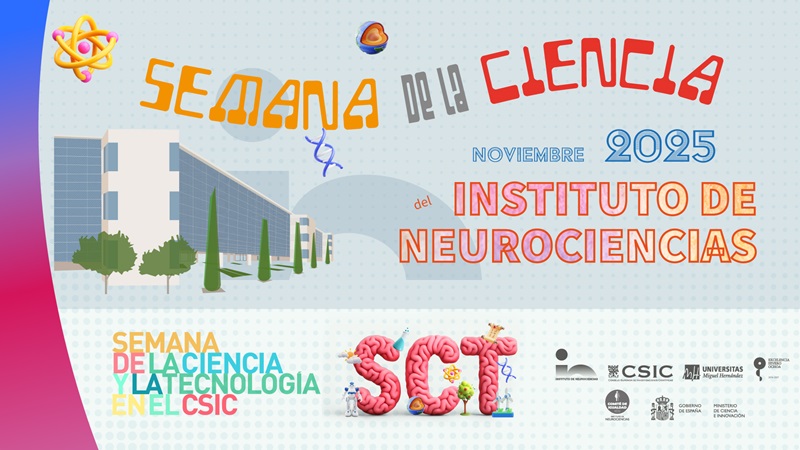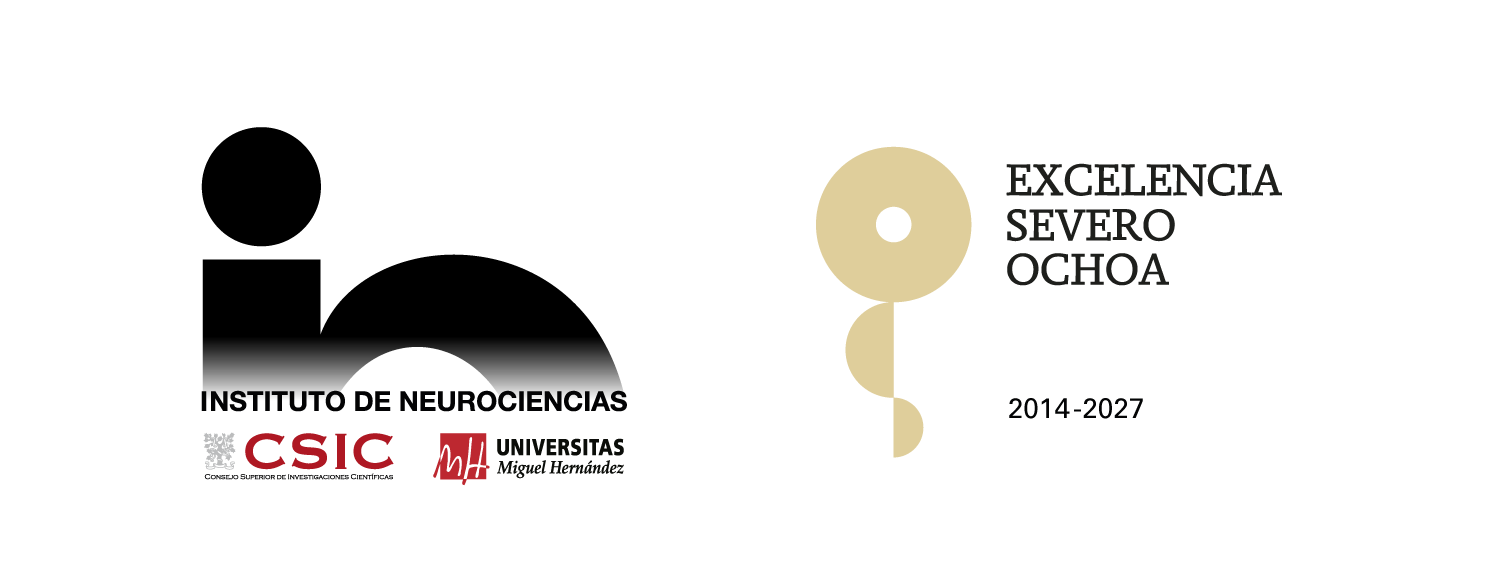Science and Technology Week at the IN CSIC-UMH, Nov 2025
2 de November de 2025
The Institute for Neurosciences (IN), a joint center of the Spanish National Research Council (CSIC) and Miguel Hernández University (UMH) in Elche, is once again participating in the celebration of Science and Technology Week. Throughout November, several researchers will visit secondary schools across the province of Alicante to give outreach talks about their research at the IN, aimed at high school students.

How neurons control alcohol consumption
Researcher Pablo Giménez Gómez, from the Cognition and Social Interactions laboratory, will present a talk on the brain mechanisms that regulate alcohol consumption. Using animal models, his team has identified a group of neurons in the prefrontal cortex that act as a “sensor” for blood alcohol levels. These neurons serve as a natural brake on excessive drinking: when activated, they reduce intake, and when inhibited, animals drink more. The findings help explain how the brain protects itself from intoxication and could open new avenues for addressing alcohol-related disorders.
Reward mode ON: dopamine, motivation, and resilience
Researcher Mario Aguilar Aragón, from the Mechanisms of Growth Control and Cancer laboratory, invites us to explore how the brain's reward system works. Often referred to as the “happiness hormone,” dopamine is actually a key molecule that plays a crucial role in motivation and resilience. This talk will examine how this neuronal circuit is activated not only by achievements or tangible rewards, but also through everyday and social experiences, and how we can learn to train it to maintain well-being and the ability to face challenges.
Do we have zombies in the brain?
Researcher Violeta Durán Laforet, from the Cellular Plasticity and Neuropathology laboratory, will discuss a phenomenon as alarming as it is real: the existence of “zombie” cells in the brain. These senescent cells stop functioning properly with age or disease but do not die, and they may contribute to the progression of neurodegenerative disorders such as Alzheimer’s. The talk will explore how scientists are investigating their role in brain aging and whether it is possible to “wake up” or remove these cells to slow neuronal deterioration.
Epigenetics: controlling the genetic code that generates cellular identity
PhD student Juan Zaragoza Lillo, from the Transcriptional and Epigenetic Mechanisms of Neuronal Plasticity laboratory, will explain how epigenetics acts as a sophisticated control system over our DNA. Although all cells share the same genetic material, epigenetics determines which genes are active and which remain silent, giving rise to different cell types. Using visual examples and metaphors, the talk will reveal how this “instruction book” of DNA is organized and will present recent research showing how the loss of certain epigenetic proteins can make neurons “forget” their identity, a finding with promising implications for cell transplantation and regenerative medicine.
Molecular machinery of neuronal communication
Researcher Yolanda Giménez, from the Molecular Mechanisms in Neurosecretion laboratory, will guide us through the processes that allow neurons to communicate with each other. This communication occurs through the release of neurotransmitters, a biological process called neurosecretion, which relies on a complex molecular machinery composed of multiple components acting with precision. In recent years, her team has discovered new functions of some of these elements, revealing how their proper coordination is essential for neuronal transmission and how their dysfunction may be involved in various diseases. Understanding this mechanism not only helps explain how the brain communicates but also highlights potential therapeutic targets.
The environment shapes memory
Researcher Federico Miozzo, from the Transcriptional and Epigenetic Mechanisms of Neuronal Plasticity laboratory, will present a talk on how the environment directly influences memory and brain function. His team has shown, using animal models, that living in an enriched environment (with more social, motor, and cognitive stimuli) enhances memory, while social isolation impairs it. Analyzing neurons in the hippocampus, a key region for memory formation, they discovered that opposite environments activate or inhibit distinct gene programs related to synaptic plasticity. These findings help explain how experience shapes the brain and underscore the importance of a stimulating environment, even in adulthood, to preserve memory and prevent cognitive decline.
Switching on the brain: how the brain activates and prepares us for life
PhD student Francesco Dori, from the Development, Plasticity and Reprogramming of Sensory Circuits laboratory, invites us on a journey through the first days of brain life. What is our brain doing before we are born? We’re still inside our mother’s belly, mostly isolated from the outside world and not really able to experience it. But the brain isn’t just waiting for birth to start working, it’s already training for life.
Waves of activity are spontaneously generated within the brain and travel through the developing “cables” that connect its different parts. These “practice signals” help neurons find the right partners and start organizing vision, hearing, and movement before real experience arrives. In this talk, we’ll see how the brain "switches on”! How these spontaneous activity patterns arise, how they spread, and why development would go wrong without them.

 Español
Español